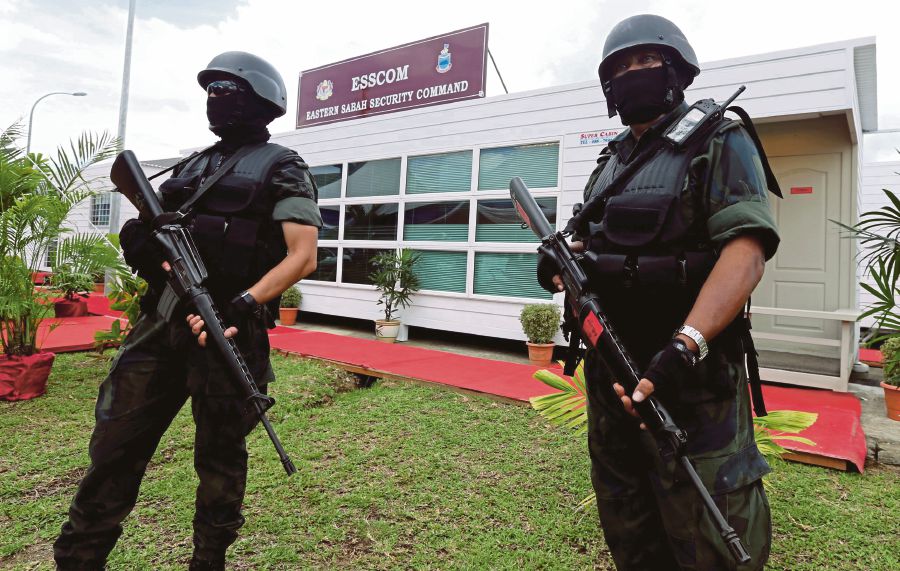
We are not a developing nation if our citizens do not feel safe within our borders.
FOR many years, the Eastern Sabah Security Zone (Esszone) became a target of the Abu Sayyaf Group (ASG), a regional terrorist organisation based in the Philippines.
The Eastern Sabah Security Command (Esscom) is the main enforcement authority for Esszone.
The government had embarked on a programme to significantly upgrade the land, sea and air defence capabilities of the Malaysian armed forces in Esszone.
Early last year, security forces in Sabah were on the lookout for 18 individuals over suspected involvement in cross-border crime and terrorism in the state’s east coast.
In October, the families of three Indonesian fishermen, who were abducted in the waters off the east coast of Sabah on Sept 23, received calls from the kidnappers demanding ransom payments.
The security forces viewed the incident seriously and increased patrols in national waters, especially in Esszone.
Kidnapping for ransom had become a trend on Sabah’s porous borders.
It appeared that ASG had made kidnapping its main business, with Malaysia as its main source of income.
However, the rate of kidnappings in the Sulu archipelago has gone down lately.
Defence Minister Mohamad Sabu confirmed that kidnappings in Esszone had declined following cooperation among Malaysia, Indonesia and the Philippines in combating criminal- and terror-related activities in the area.
However, ASG may have shifted from kidnap-for-ransom activities to tobacco smuggling to fund its operations.
Since smuggling illegal tobacco is considered low risk and profitable, kidnapping activities in the ESSCOM was reduced.because the latter is considered low risk.
TOBACCO SMUGGLING
The illegal cigarette trade is a lucrative business.
ASG could also be funded by local organised crime gangs and it used Malaysia as a base to fund its activities.
With vast amounts of money in its possession, it is a small price to pay for crime syndicates to splash on lowly-paid law enforcers.
A corrupt officer can expect massive returns on investment - i.e. RM2.5 million from a 12m container that contains 10 million sticks or 500,000 packets of illegal cigarettes, which cost about US$100,000.
One way to fight crime syndicates is to cut off their main source of funds or financiers.
Law enforcement agencies should be aware of the terrorists’ new strategy in financing their activities.
EFFECTIVE SOLUTION
Sabah Police Commissioner Datuk Omar Mammah said they received intelligence that indicated kidnap-for-ransom groups and Abu Sayyaf militants were attempting to commit cross-border crimes, thus it was about time that Esscom brought about more effective solutions to the dilemma.
If not, this terrible trend will continue again.
Due to an insufficient budget, the agency could not be equipped with technology.
Apart from that, Sabah’s tourism market may perform worse this year if there are more beheadings.
By paying a ransom, we are not finding a permanent solution, but only encouraging further kidnappings and blackmail by the militants.
NEED FOR MORE RADAR EQUIPMENT, PATROLS AND SPECIAL BOATS
In tackling the issue, border enforcement officers should be well equipped.
It is hoped that more modern radar devices could be installed at selected islands and security could be tightened at sensitive areas through regular patrolling.
There is also a need for special boats to better monitor encroachment of foreign boats on Sabah waters.
It is learned that the Royal Malaysian Navy is expected to acquire new assets, including 18 fast interceptor craft (FIC) and three maritime operation helicopters, which cost more than RM400 million.
According to Admiral Tan Sri Mohd Reza Mohd Sany, FIC would provide a boost to the country’s maritime security.
They will be placed on the east coast of Sabah.
Make sure the new assets are suitable and follow proper procurement procedures.
Over the last few years, hundreds of millions of ringgit were lost due to poor procurement and fraud.
It was reported that the Defence Ministry had raised the issue of questionable purchases of military assets to the anti-graft authority
PROFESSIONAL HOSTAGE NEGOTIATOR
There is a lack of expertise in hostage negotiation.
Even with well-trained enforcement officers, the chances of the nation’s borders being breached still exist.
When borders are breached and a kidnapping occurs, we need trained negotiators.
They need to be well-versed with techniques that could make the militants change their mind.
Thus, it is time that the police or Esscom formed a hostage negotiation unit.
SECURITY IS NON-NEGOTIABLE
We have to be serious in preventing kidnappings and apply new security strategies to overcome the issue in the long term.Such incidents have a high possibility of recurring because the current strategy does not seem to work.
We should maximise Esscom’s force to prevent future kidnappings and let the professionals tackle the issue without any political interference, allowing them to choose the right assets, deploy the right strategy and avoid procurement fraud.
This is because political interference partly hinders enforcement officers from doing their job professionally.
RESTRUCTURING ESSCOM
The Defence Ministry is taking a proactive action by restructuring Esscom to ensure it plays a better role.
However, it is even more important to upgrade its equipment.
When changing the agency’s structure, it is important for the government to consider forming a single entity border patrol unit.
INTEGRITY OF OFFICIALS
Finally, the issue of integrity of law enforcement officers needs to be addressed.
Background screening and rotation of officers are need to be carried out to prevent corruption, which threatens national security.
We are not a developing nation if our citizens do not feel safe within our borders.
Instead, what is needed is a coherent long-term policy and a blueprint to combat terrorism, including in Esscom.
We want to ensure the safety of Sabah folk and tourists, who use the state’s waters, as well as those residing near Esszone.
[The writer holds a professional chair at HELP University’s Institute of Crime and Criminology]
https://www.nst.com.my/opinion/columnists/2020/01/552636/fighting-cross-border-terror-sabah

No comments:
Post a Comment
Note: Only a member of this blog may post a comment.